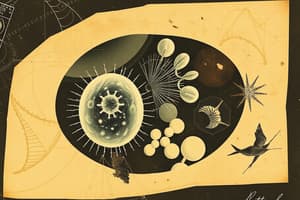Podcast
Questions and Answers
Who was the natural philosopher who first observed and described cells in 1665?
Who was the natural philosopher who first observed and described cells in 1665?
Robert Hooke
What is the main focus of cell biology?
What is the main focus of cell biology?
Studying the basic units of life and their essential components and functions.
How is cell biology connected to evolutionary theory?
How is cell biology connected to evolutionary theory?
Evolutionary theory explains the development of new cellular structures, functions, and organisms over time.
When did Darwin's seminal work contribute to the understanding of cellular evolution?
When did Darwin's seminal work contribute to the understanding of cellular evolution?
What are some of the recent focuses in cell biology research?
What are some of the recent focuses in cell biology research?
What recent breakthroughs have occurred in the field of cell biology?
What recent breakthroughs have occurred in the field of cell biology?
How is the future of cell biology described in the text?
How is the future of cell biology described in the text?
What are some topics covered in modern cell biology research?
What are some topics covered in modern cell biology research?
Flashcards are hidden until you start studying
Study Notes
Diving into Cell Biology: From Hooke's Discovery to Modern Science
Cell biology, the study of the basic units of life and their essential components and functions, is a fascinating venture that has illuminated our understanding of the biological world. This rich subject has a history that dates back to the 17th century and has grown into a field that encompasses everything from the molecular machinery within cells to the complex interactions between cells.
Early Roots: Robert Hooke and the Discovery of Cells
The cell was first observed and described by the English natural philosopher Robert Hooke in 1665. Hooke, using a microscope, discovered what he called "cells" in the tissues of plants, and over time, the concept was expanded to include animal cells as well.
Evolutionary Theory and the Cell
Cell biology is intrinsically linked to evolutionary theory. Since Darwin's seminal work in the mid-19th century, the evolution of organisms has been primarily understood in terms of genetic variation, natural selection, and the development of new cellular structures, functions, and organisms. As science evolved, the complexity of cellular processes has been revealed, and evolutionary biologists have refined their understanding of how cells and their functions have changed over time.
Modern Research and Its Challenges
Contemporary cell biology research explores a wide variety of topics, including the role of cells in disease, the intricacies of cellular communication, and the developmental processes that shape organisms. One area of recent focus is how economic inequality affects the biology of cells and organs, particularly through chronic stress and its impact on cellular aging, inflammation, and brain function.
The Cell in Biology News
Cell biology is a dynamic field that is constantly evolving. Recent breakthroughs include research into the role of "junk cells" in fighting malaria, genetic factors that influence severe Lassa fever, and the brain's steering system in fruit flies. These new findings showcase the breadth and depth of cell biology research, which spans from the molecular to the organismal levels.
The Future of Cell Biology
As the field of cell biology continues to grow and evolve, researchers are poised to make new discoveries that will enhance our understanding of life and improve our ability to diagnose and combat diseases. The future of cell biology is bright, and the potential for biological innovation is limitless.
Studying That Suits You
Use AI to generate personalized quizzes and flashcards to suit your learning preferences.




